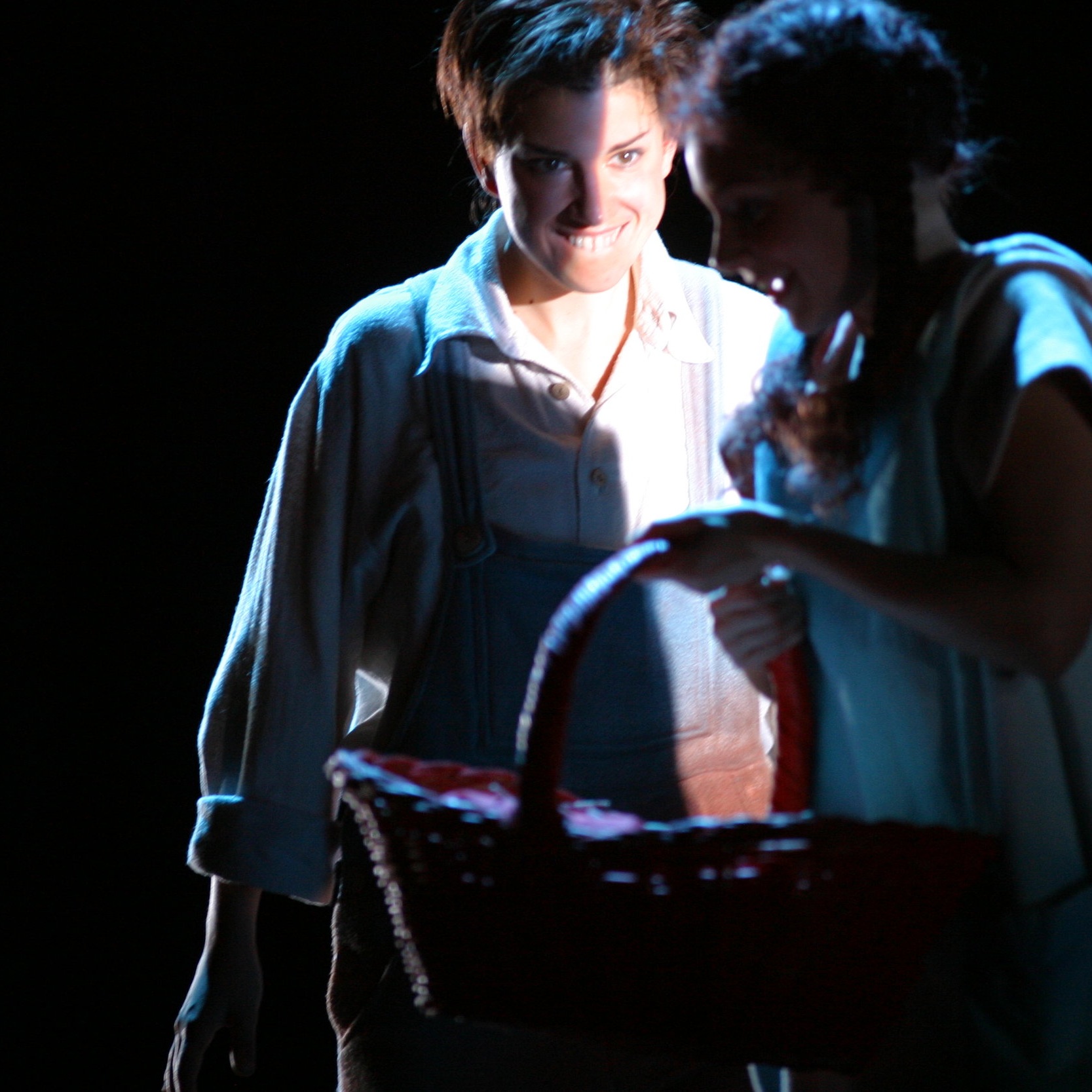Carmen
Title role in Carmen
““Tamara Gura in the role of Carmen is a real stage animal””
““Tamara Gura as Carmen fulfills every fantasy imaginable-from freedom- loving woman for the female audience, to a more erotic embodiment for the male audience. The US born mezzo-soprano delivers this youthful portrayal with great vocal maturity.” ”
““Tamara Gura offers a very youthful and physically ideal embodiment of the main role . The uninhibited gesture and emotional assaults directed towards herself and others were very convincing. Vocally, she offers a beautiful middle register and effortless high notes.” ”
““Tamara Gura is a vocally confident Carmen, with sublime mezzo tones... She masterfully accompanies herself in her dance and castanet scene in the second act with the improvised fragments of a broken plate.””
““With her dark-timbred voice, Tamara Gura gives a truly compelling role debut as Carmen.””
““Tamara Gura portrays the role with masterful acting, and sings at a very high level.” ”
““Tamara Gura’s dark toned mezzo gleams. She avoids the eye rolling and hip swinging clichés one associates with Carmen , making her presence and performance all the more authentic.” ”
Isabella
Isabella in "L'italiana in Algeri"
““The best, and that in every regard is Isabella, the american born Tamara Gura, who has worked her way in the last years into the highest league of mezzos. Whoever hears and sees her onstage inmediately can tell why.””
““Absolutely a voice which lingers in your memory. Tamara Gura acts masterfully and is a wonderful mezzo soprano who is also able to deliver this eroticism through her voice.” ”
““ Tamara Gura as dream woman Isabella wears a gold bikini and a mini skirt, but musically she wears the pants and brandishes the riding whip. Possessing the ideal vocal timbre, expression and stamina, her interpretation of Rossini’s music comes very close to (legitimate) vocal anarchy. Tamara Gura jumps from octave to octave, flies up/down/sideways. She trumpets, languishes, and entices.” ”
““Tamara Gura dazzles with mezzo coloratura and delightful acting.””
““Mezzo soprano Tamara Gura makes the most of her coloratura...the most exuberant high notes serve the drama and are presented with pristine, flawless technique. She also has wonderful stamina, singing “Pensa alla patria” absolutely effortlessly at the end of the opera. She takes control, fueling the men’s testosterone into overdrive with her model figure.””
““Tamara Gura turns not only the heads of Taddeo and her other male suitors, but also immediately those of the audience, with her sonorous mezzo voice, her stunning stage presence, and her spontaneous acting.” ”
Isabella
Isabella in "L'italiana in Algeri"
““Tamara Gura...the wonderfully timbred, absolutely secure, and with sex appeal in abundance, leaping around the stage... marvellous in every respect.” ”
““In the title role, Tamara Gura’s rich-voiced mezzo and her dynamic stage presence merited admiration.” ”
““Isabella is played by Tamara Gura, who purrs and coos her coloratura with tremendous sensuality. This Isabella is a fascinating character, who knows how to put her feminine charms to good effect in every way, including vocally, to entice the men.” ”
““Ravishing, above all, Tamara Gura as the incredibly sensual Isabella.””
““Beautiful mezzo voice, secure technique and stylistically convincing...pleasurable in all registers, moving from one to the other with no break. High notes, octave jumps and variations... Gura excelled and distinguished herself with this.” ”
ARIODANTE
Ariodante in Ariodante
““Tamara Gura in the title role was simply a sensation. The elegant American, of whom there is a film portrait on YouTube, possesses a mezzo voice as agile as it is expressive, and whose warmth, fullness and roundness movingly captures not only the expression of grief(Ariodante believes he has been betrayed by Ginevra and seeks death), but is also able to express flaming joy and jubilation.””
““Gura delights as Ariodante with a warm-timbred mezzo and wonderfully flexible coloratura. Her big aria, “Scherza infida” represents a high point of the evening in which she movingly gives expression to her deep sorrow over the apparent betrayal of Ginevra. In the third act she impresses with absolutely heroic sounds.””
““The premiere is a singer fest. Stepping in for the title role, Tamara Gura shines not only with emotionally charged coloratura storms, but also gives grandeur to her mezzo in the Lamento.””
“ “Tamara Gura as Ariodante is a revelation! Had she only sung one aria, she would have been the star of the evening. I am referring to the long, full of desperation “Scherza infida”, the central aria of the opera. Stupendous vocal technique, stamina and concentration alone would not guarantee a success, were it not for the exhilarating expressivity of this singer.””
““Ariodante’s aria „Scherza infida“ lasts for 10 minutes... Tamara Gura sings (not only) this scene believably, movingly with primal, dark intensity.” ”
““Tamara Gura stands out vocally. The American, in the pants role of Ariodante, delivered her arias with such masterful ease and flawless vocal clarity that it was a joy.””
““Tamara Gura dazzles, both dramatically and vocally, in the pants role of Ariodante. She delivers the treacherous coloratura with effortless elegance””
““Tamara Gura brings all of the colors of her dark and velvety iridescent timbre to the role of Ariodante... Deep low notes and an effortless middle range were crowned by smooth shining highlights in the high register.””
““Mezzo-soprano Tamara Gura’s outstandingly sung aria “Scherza infida” was the musical highlight of the performance.””
““Tamara Gura possesses an exquisite vocal timbre and wins favor with the audience in her Bravour aria „Scherza infida“. Her coloratura are crystal clear.””
““The title role is proudly entrusted to Tamara Gura (already heard in Karlsruhe at a very high level in the title role of Radamisto). She delivers her Bravour arias “Con l’ali di costanza” and “Dopo notte” with great charisma.””
For this role, she was named as best singer by the reviewer Christoph Zimmermann (Der neue merker, Opera London) Link to Die Welt:Best Singer article
LA CENERENTOLA
Title role in La Cenerentola
““The cast was led by outstanding Tamara Gura, a mezzo-soprano with a velvety timbre and an abundance of vocal richness and volume in the character of Angelina. Her coloratura are skillfully executed, the sound is very well projected and covered...one of the most important Cinderellas of the moment.” ”
““Tamara Gura sang the role of Angelina with deep, well-grounded, velvet voice.” ”
““Like Cecilia Bartoli, she has a dark voice with a textured contralto sound, comfortably passing into vibrant and impressive coloratura, as demonstrated in the final aria Non più mesta” ”
““Tamara Gura captivates the audience not only with her high notes, but most of all with the low, velvety tones of her crystal clear mezzo. Her voice and coloratura flow effortlessly and with lots of volume. Such a voice is like a precious fine wine,that one would like to enjoy more often.” ”
““Tamara Gura stands out in the title role with exquisite voice.” ”
““The role of Cenerentola with its wonderful but treacherous coloratura passages has become a show piece for virtuosic mezzos. Tamara Gura masters these vocal demands with bravura, and throughout the whole opera ,as well as in the final rondo, she is effortlessly a match for the the greatest mezzos of this repertoire. The slender, attractive young singer has a dramatic alto voice in the low range and also possesses a full sounding, beautiful middle voice, and seems destined for the great dramatic roles” ”
““Tamara Gura as Angelina, the angelic stepsister, has my unqualified admiration. A lovely, gentle personality with a voice which speaks straight to the heart, and, when necessary, fills the entire theater, rich-sounding with never any hint of hardness. On top of this, she convincingly embodies the different facets of the character, from mistreated young girl to triumphant princess.””
La Cenerentola
Title role in La Cenerentola
““Tamara Gura possesses a velvety dark voice and an effortless technique. Her legato is confidently on the breath; her coloraturas precise pearls, delivered with flair.. The dark colour of Tamara Gura’s voice will happily be ringing in our ears for some time to come.” ”
““Both guests find special favor with the audience: the graceful, refined and flexible even in the lowest ranges of her role Tamara Gura as Angelina.””
““The deep silky voice of Tamara Gura gives the title role of Cenerentola the essential melancholy, from which the liveliest joy for life can spurt out,like a fountain in the castle gardens.””
““Cinderella, the spectacular Tamara Gura, leaves nothing to be desired. Her underdog character mirrors itself in her exquisitely beautiful, but also melancholic Mezzo voice, with a lush and rich low register, and admirable high notes.””
““Tamara Gura sings the title role ravishingly; in all high and low registers. She even sings the most difficult coloratura with virtuosity.” ”
““The role of Cenerentola is sung by Tamara Gura. Her timbre is so dark and warm, it sounds almost like a contralto. Her powerful lyricism is most impressive.” ”
““What a voice! Not first by her two final arias Tamara Gura assured the strongest applause of the whole evening.” ”
RADAMISTO
Title role in Radamisto
““Excellent Tamara Gura covered the whole range of baroque emotions from wild revolt to painful mourning. Radamisto’s aria “Ombra cara” , with which he mourns the apparent death of his wife, is among the most impressive arias that Handel ever wrote, and Tamara Gura’s deeply emotional singing made time stand still for almost 10 minutes.” ”
““Tamara Gura created the male title role of Radamisto with a beautifully even tone, deeply expressive singing.” ”
““Tamara Gura gives a brilliant vocal and dramatic performance in the role of Radamisto. She glamorously embodies the androgynous ideal of Handel’s traditional classical hero.” ”
““The title role finds in Tamara Gura the perfect embodiment. With beautifully polished mezzo-soprano she characterized the perplexity, but also the deep love of Radamisto.””
“ “Tamara Gura sang the role of Radamisto with highly emotional, convincing and sophisticated singing.” ”
““Tamara Gura’s supple and sinuous singing brings nobility to the title role.””
DORABELLA
Dorabella in Cosi fan tutte
““Dorabella is played with joyous abandon by mezzo-soprano Tamara Gura. Her Act I aria ‘Smanie implicabili’ is a glorious display of inflated, histrionic ‘suffering’.” ”
““Tamara Gura was an affecting Dorabella, singing with a darker color that distinguished her from her steelier sister. She didn’t just sing her signature aria, ‘Smanie implacabili’, she embodied it.””
““Gura’s Dorabella made the most of her solo turns, notably in an anguished but controlled “Smanie implacabili.” ”
““First rate Dorabella” ”
““Tamara Gura’s Dorabella showed her strength for lyric power and blended wonderfully with Fiordiligi.””
““Tamara Gura’s unique dark timbre as Dorabella brought the required eroticism to the role.””
““ effortless, rich in nuances and shades, and perfect for Mozart.””
OLGA
Olga in Eugene Onegin
““Tamara Gura was strong as Olga, sung with a smoky tone and a charcoal timbre with a pleasant sense of teasing in her voice.””
““Tamara Gura shone as the over-eager Olga.” ”
““Tamara Gura’s ebullient Olga” ”
Sesto
Sesto in Giulio Cesare
““Tamara Gura convincingly portrayed the adolescent son of Cornelia, Sesto Pompeo with her delightful voice. She mastered her demanding arias perfectly, including the last one at breakneck speed. In the duet with Christa Mayer as Cornelia, the two beautiful voices blended ideally.” ”
““Exhilaratingly sung and smartly played the trouser role (Sesto ) by the young contralto Tamara Gura””
““The best performance was rendered by Tamara Gura, who sang Sextus with well placed, warm and flexible mezzo-soprano.””
Cherubino
Cherubino in Le Nozze di Figaro
““Mezzo-soprano Tamara Gura is perfectly cast as the page Cherubino. Gura’s physical comedy is a delicious sight, and even when the character is famously dressed as a girl, she maintains the illusion so effortlessly it is genuinely easy to forget this is a female actor playing a boy. Gura even inflects her voice in an incredibly appropriate way.””
““Tamara Gura looked properly boyish as Cherubino, making the most of “Non so più” and offering a touching “Voi che sapete”.””
““The well-meshed cast was top notch from top to bottom...Mezzo-soprano Tamara Gura, a terrific comic actress, made the most of the bratty Cherubino.””
““Tamara Gura shines in her USA and CCO debut in the trousers role of Cherubino.” ”
““Tamara Gura was excellent from her first entrance, moving with all the awkwardness of a teenager. I found her unusually convincing throughout, and her aria “Voi che sapete” was especially charming.” ”
““Tamara Gura’s CCO debut in the trouser role of Cherubino did not disappoint. This artist is blessed with a great set of pipes and her playful acting of the role is endearing.””
““Tamara Gura’s ‘Non So Piu’ was lusty and hilarious.””
““Above all, it is the silky smooth singing and playful acting of Tamara Gura, a wonderful Mozart singer, as Cherubino that stands out.””
““Tamara Gura is an erotic Cherubino and gives a wonderful portrayal of the young page, whose charm is perfectly expressed through her supple, dark timbred and youthful mezzo voice.””
Maddalena
Maddalena in Rigoletto
““The daring Tamara Gura as the provocative and beautiful Maddalena.” ”
““Tamara Gura as Maddalena makes a strong impression both vocally as well as visually.””
““Tamara Gura – a luxury Maddalena” ”
““Tamara Gura took on the erotic staging demands of Maddalena with absolute ease. Vocally, she filled the role masterfully with her sensual and deep mezzo soprano.””
Hermia
Hermia in A Midsummer Night’s Dream
““..Tamara Gura’s velvet-toned Hermia..””
“Tamara Gura was a spitfire Hermia”
“persuasive”
““a stand-out.””
“Tamara Gura impressed with her magnificent, dramatically coloured voice.”
“Tamara Gura, winner of several awards, is a powerful singer and strong actress as Hermia. She sings for the first time at the Frankfurt Opera. A definite win!”
“Star studded cast...Hermia, the charming Tamara Gura, a poised sorority girl with a warm, distinctive mezzo. Her dusky singing handily accommodated the role´s mood swings from hotheaded resoluteness to whimpering acceptance.””
““Gura’s fruity and rich mezzo-soprano... “”
““Kate Valentine, Tamara Gura, Allan Clayton and Benedict Nelson are a convincingly youthful quartet of lovers.”
”
““superbly sung””
““A vocally accomplished quartet of lovers...Tamara Gura’s nervy Hermia.””
““excellent””
BALKIS
Balkis in La rencontre imprévue
““Tamara Gura as Balkis steers each velvety tone with ease, her voice brilliantly gleaming even in the very lowest registers. Together with her stage partner, she brings to life the servant couple with much humor and demureness, vocally as well as theatrically convincing.” ”
““Tamara Gura’s extremely expressive mezzo-soprano voice is a stand out.” ”
““Tamara Gura wins favour with the audience with her warm Mezzo, and her sparkling joyful acting.””
Hänsel
Hänsel in Hänsel und Gretel
““Tamara Gura gave an outstanding performance as Hänsel. This singer possesses a wonderful, well supported, warm and soulful mezzosoprano voice.””
GISMONDA
Gismonda in Lotti’s Teofane
““It is perhaps Tamara Gura’s Gismonda however that most touched the spirits:here is a mezzo with a beautiful timbre, dark and round, with impeccably welded registers, who has both style and temperament, as is witnessed in her mad aria in the second half; flawlessy mastered- a flashback to Durastanti. concertonet.””
PIACERE
Piacere in Il Trionfo del tempo e del disinganno
““ “Tamara Gura jumping in on short notice, gave a vocally and dramatically convincing as well as sensual performance of Piacere.””
““This aria (Lascia la spina) was sung with very special beauty and tenderest emotions by Tamara Gura as Piacere in the Fest-Konzert of the Deutschen Händel Solisten.” ”
rosina
Rosina in Il barbiere di Siviglia
““Tamara Gura is a first rate Rosina, and dramatically thoroughly delightful.””
Idamante
Idamante in Idomeneo
“““The highlight of the performance is Tamara Gura as Idamante who sings with a wonderfully warm timbre...The duet with Ilia is charming, and the famous quartet of protagonists sounds excellent.””
ZAIDA
Zaida in Il Turco in Italia
““Tamara Gura sang with beautiful mezzo and fantastic stage presence.””
““ a mezzo soprano voice rich of colors, as well as a secure art of belly dancing, offered proof of her bravura.” ”
““… whose mezzo is just as strikingly beautiful as her belly dance””
“ “Equally delightful was Tamara Gura‘s sylph-like Zaida, who sang with impish humour and a pure tone, and could even bellydance-quite a feat for someone with no visible belly.” ”
Orfeo in Gluck's Orfeo ed Euridice
““With her beautiful mezzo voice and authentic expression, Tamara Gura offers a convincingly grieved but determined Orfeo... A standing ovation that is fully deserved.””






































